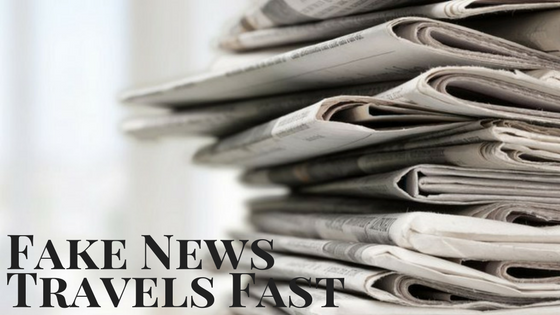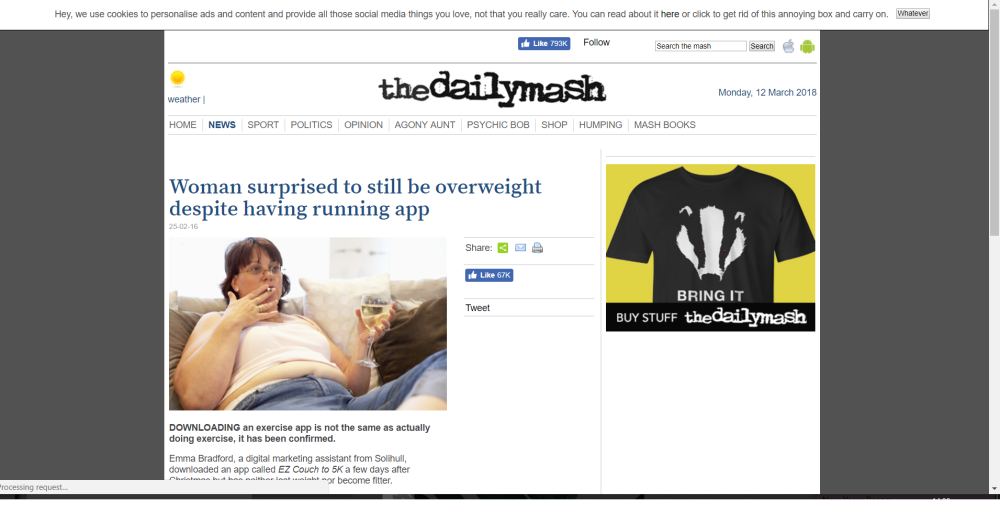
Social media allows news to travel to vast numbers of people at ridiculously fast speeds. Because of this we should always be wary of the legitimacy of what we are reading online.
Fake news
Fakes news is simply news that spreads false information.
Although fake news is not a completely new concept, it has recently come to the forefront of the media attention after the role that it played in the US Presidential election. During the US elections propagandist used the social media sites, such as Facebook and Twitter, to turn fake news into viral sensations (Manjoo, 2017). It was found that most popular fake news stories were more widely shared on social media than the most popular mainstream legitimate news stories (Silverman, 2016). Fake news is seen as a massive problem for democracy and free debate.
The distribution of news on social media is dramatically different from any past means of spreading news because, content can be shared among social media users with no significant third part filtering, fact-checking, or editorial judgement (Allcott and Gentzkow, 2017).
How to spot fake news
Video created by me, content taken from Facebook.
My experience with Fake News
Although this example is going to make me seem ridiculously gullible, this is just an example of fake news and how anyone can fall for it – even the most obvious of articles.
Once a friend sent me this article on Facebook:

I responded saying something along the lines of ‘omg how could any one be so stupid and think that would work!!!!’
The article was on the ‘the daily mash’…
Although this is a silly example, it highlights the need to stay vigilant when reading information online!
To think about
Facebook has recently invested $14 million into an initiative to try and combat fake news. Do you think that combating fake news is possible?
References
Hi Chloe,
I enjoyed reading your blog, especially the part where you discuss your own personal experiences with Fake News.
I wonder whether the satirical fake news articles on websites such as The Daily Mash are harmful to people – considering they only seem to post articles about (dare i say) irrelevancies, like the example you screen grab you posted.
The question here is whether you think Fake News is always harmful and to the detriment of the reader?
I look forward to hearing from you,
Natasha
(Word Count: 87)
LikeLike
Hey Natasha,
Thanks so much for your comment. I think that is very subjective and depends on the person that is reading the newspaper article.
After doing a quick Google I came across this article, https://www.poynter.org/news/satirical-fake-news-site-apologized-making-story-too-real, when the facts within the satirical fake news article were a little too real and therefore offended a reader. Therefore i think that satirical fake news must normally be so far from the truth that it does no offend the reader. The people that write the articles must have the e very careful in what they are writing to ensure that they are pure satire and not offending people.
What do you think? Do you enjoy reading satire?
Chloe
LikeLike
Hi Chloe,
I really enjoyed reading your blog post. It is very nicely structured and I found your video very useful! I also particularly like your example of an article you have previously fallen for. I can totally relate – I have only just realized (through my research on this topic), that a video I watched on Facebook and found absolutely hilarious a few years ago, was a complete setup – and I genuinely thought it was real, that’s why I found it funny.
Have a look:
Have you ever seen it? Would you have thought it was real too, or is it just me?
This video obviously made me laugh and didn’t do me any harm. So I wonder, do you think all types of fake news are harmful to web users? Do some make a positive contribution?
I look forward to hearing your thoughts on this,
Anna
LikeLike
Hey Anna!
Thanks for your question, no I hadn’t seen that video before but it made me laugh too! No I dont think that all fake news is harmful to web users, and I think that some needs to be taken with a pinch of salt. I also feel like sometimes it can try to make worse situations more lighthearted.
What do you think?
Chloe
LikeLike
Hey Chloe,
I totally agree. Not all fake news is harmful to users – the important thing is for web users to have an awareness of fake news so that they don’t believe everything they read!
Anna
LikeLike
Hi Chloe,
I liked your article a lot, especially the video. I too, focused on fake news in the user-content-generated Web.
User-generated content gives the impression of free speech because as you say, there’s no third party filtering the content, but it’s not just people that are spreading fake news, it’s social bots too. Often used in the early phases of a fake news article campaigns to start the spread, they’re responsible for targeting highly connected users (Shao et al., 2017), so it’s a welcoming thought that Facebook have invested in their initiative to combat fake news. However, Tim Berners-Lee has commented how the web is becoming “weaponised” because large tech companies have so much power. He’s called for “a legal or regulatory framework that accounts for social objectives” (Berners-Lee, 2017). Do you think this will help stop the fast spread of fake news, or lead to heavy censorship on the web?
Adam
LikeLike
Hi Chloe!
Your post was very interesting to read! Your video also provides a very useful breakdown of how we can all protect ourselves from fake news.
You discussed fake news as part of a problem in politics that can affect democracy. Ali Velshi, NBC News correspondent, argues in his TEDx talk that being delivered true news as being fake is much more serious than being delivered straight up lies. An example he offered was the fact that, on Twitter, President Donald Trump ruled Russia’s involvement in the U.S. 2016 elections as being false, after 17 intelligence agencies told him otherwise. Velshi then says that 80% of Trump’s followers believed him.
How could we combat these situations? Would traditional media, whose popularity has been declining in the online world, be able to find an impactful voice again using today’s technology?
Thanks,
Iarina
LikeLike
Hi Chloe,
Thanks for a great post. It was easy to follow and the video was very informative. I share the same point of view that “fake news travels fast” and social media is a platform that allows this to happen. I have read about Facebook’s investment of algorithms to filter fake news. It appears to be a great move but it was not effective: https://www.theguardian.com/technology/2017/may/16/facebook-fake-news-tools-not-working.
In addition, I think allowing companies such as Google and Facebook to filter news means that they can control what ideas to be shared and thus leads to “filter bubble” (Eli Pariser, 2011). Do you think the government should allow these companies to continue developing their filtering algorithms or should ban them?
Eli Pariser’s TedTalk on “filter bubble”: https://www.ted.com/talks/eli_pariser_beware_online_filter_bubbles#t-519902
Hong.
LikeLike
Hi Hong,
Thanks for your question! I have done a little bit of reading into the role of Facebook and filter bubbles before. Basically, Facebook does not class itself as a news company, despite the News Feed being one of if not the largest news distributor in the world. Therefore because Facebook doesn’t class itself as a news company it doesnt have to take a political stand point, or voice opinions. Because of this, Facebook is still simply a social media site that wants to make money. If Facebook removed filter bubbles, meaning users see posts that they dont necessarily agree with then it could have a negative effect on their emotions – making them log off of their account. I know that I have definitely turned off Facebook when I have seen political debates on my homepage that I just cannot be bothered to read have come up. If users aren’t online, they’re not clicking ads and Facebook is not making money. It is all business minded, there is not a political agenda at the forefront of this problem.
I do think that something needs to be done about it, but having said that there are filter bubbles offline as well as offline, we tend to only make friends with like minded people etc so I don’t know how big an impact it would make. I think it would be really interesting to see what happenedd if Facebook removed algorithms for one day, I’d love to see the different content that I would get on my Facebook feed.
I would love to know what you think about it all?
Chloe
LikeLike
Hi Chloe,
Really Interesting read thanks! I did enjoy the article. A question I’ve thought about a bit recently is how do we define fake news – is there a requirement for it to have a malicious agenda or can it merely be factually incorrect but mistaken?
Your experience with fake news was quite a funny story but telling of just how easily people can be duped by it. How can we combat fake news? It it a technological approach, or societal through education?
Tom
LikeLike
Hi Tom,
Thanks for your question, no I don’t think that you can always class false news as having a malicious agenda, as in my example there was no malicious agenda there, but I definitely do think that there are different types of fake news.
I don’t think that fake news can be resolved by technology or education alone, I think that there needs to be a mixture of the two, for example, if algorithms or something were put in place to try and combat fakes news (i’m not entirely sure how they plan to combat fake news technologically but yeah) why would the example above why should the article above be removed – it is obviously only being posted as a lighthearted jokes, therefore in that case I think that people need to be educated to not fall for it. In terms of fake news produced by bots, yes i think that a technological approach needs to be taken to combat it.
Chloe
LikeLike